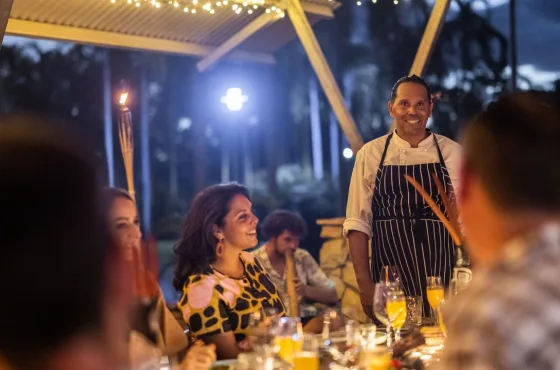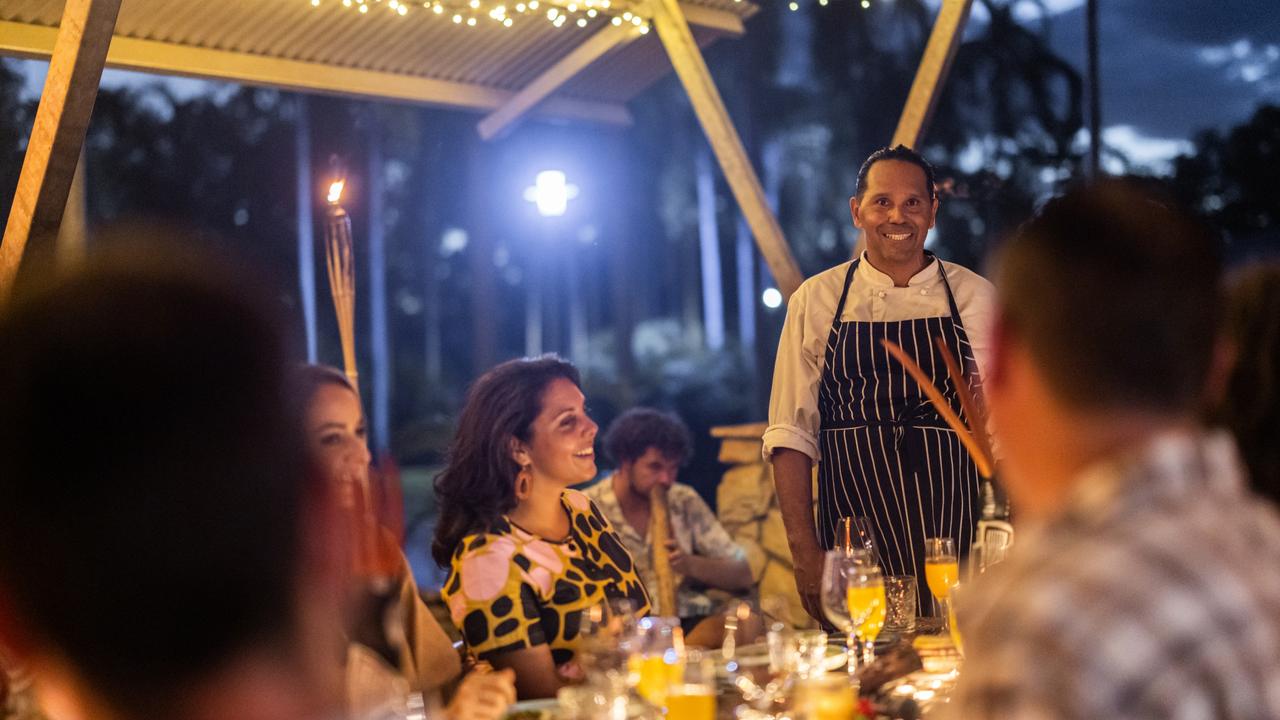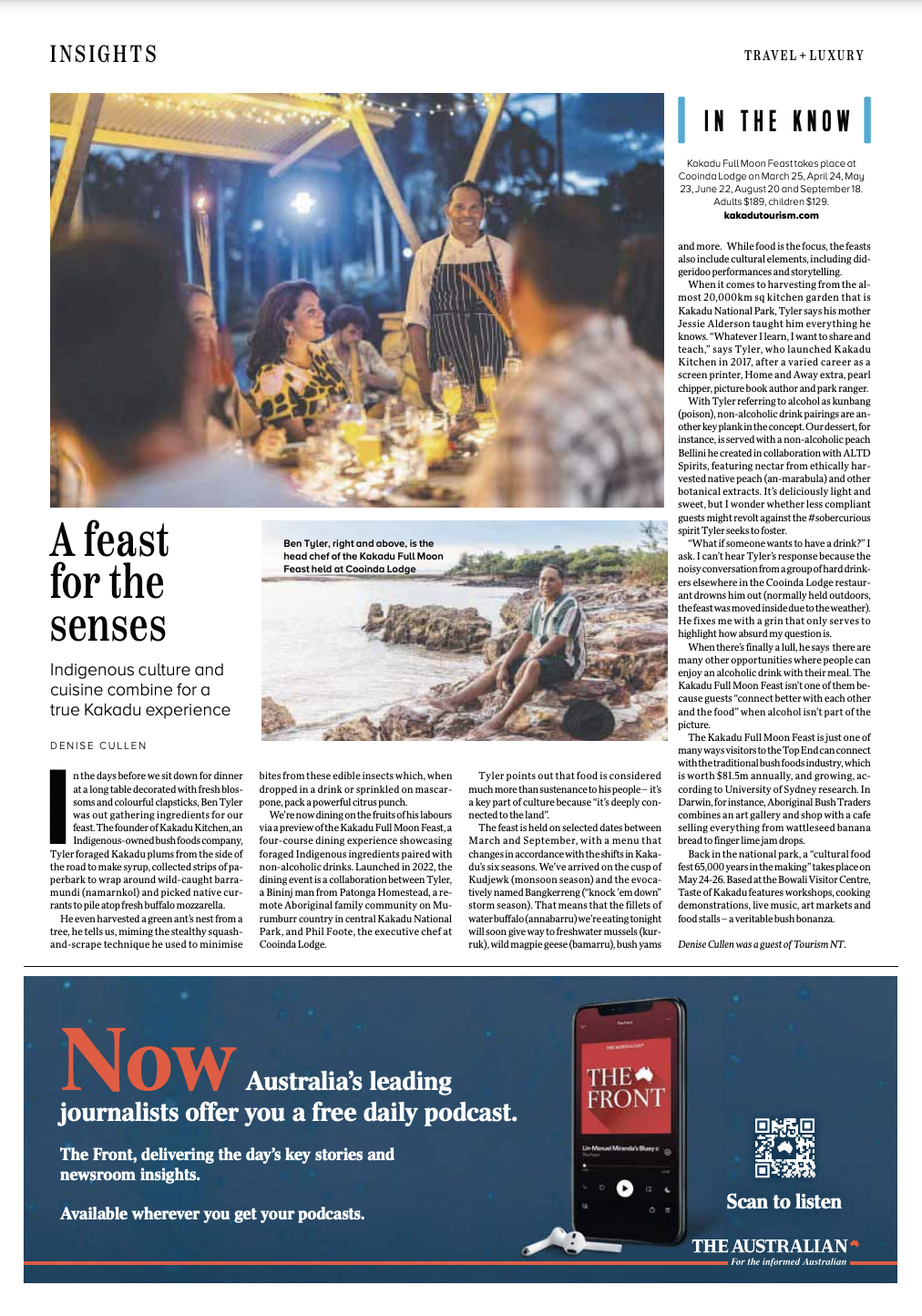
Kakadu Dird Dinner: A Feast For The Senses
Indigenous culture and cuisine combined for a true Kakadu experience
By Denise Cullen

"As a full moon rises over Kakadu National Park, visitors can sample the unique flavours of one of Australia’s most beautiful wilderness regions."
In the days before we sit down for dinner at a long table decorated with fresh blossoms and colourful clapsticks, Ben Tyler was out gathering ingredients for our feast. The founder of Kakadu Kitchen, an Indigenous-owned bush foods company, Tyler foraged Kakadu plums from the side of the road to make syrup, collected strips of paperbark to wrap around wild-caught barramundi (namarnkol) and picked native currants to pile atop fresh buffalo mozzarella.
He even harvested a green ant’s nest from a tree, he tells us, miming the stealthy squash-and-scrape technique he used to minimise bites from these edible insects which, when dropped in a drink or sprinkled on mascar-
pone, pack a powerful citrus punch. We’re now dining on the fruits of his labours via a preview of the Kakadu Full Moon Feast, a four-course dining experience showcasing foraged Indigenous ingredients paired with non-alcoholic drinks. Launched in 2022, the dining event is a collaboration between Tyler, a Bininj man from Patonga Homestead, a remote Aboriginal family community on Murumburr country in central Kakadu National Park, and Phil Foote, the executive chef at Cooinda Lodge.
Tyler points out that food is considered much more than sustenance to his people – it’s a key part of culture because “it’s deeply connected to the land”. The feast is held on selected dates between March and September, with a menu that changes in accordance with the shifts in Kakadu’s six seasons. We’ve arrived on the cusp of Kudjewk (monsoon season) and the evocatively named Bangkerreng (“knock ’em down” storm season). That means that the fillets of water buffalo (annabarru) we’re eating tonight will soon give way to freshwater mussels (kurruk), wild magpie geese (bamarru), bush yams and more. While food is the focus, the feasts also include cultural elements, including didgeridoo performances and storytelling.
When it comes to harvesting from the almost 20,000km sq kitchen garden that is Kakadu National Park, Tyler says his mother Jessie Alderson taught him everything he knows. “Whatever I learn, I want to share and teach,” says Tyler, who launched Kakadu Kitchen in 2017, after a varied career as a screen printer, Home and Away extra, pearl chipper, picture book author and park ranger. With Tyler referring to alcohol as kunbang (poison), non-alcoholic drink pairings are another key plank in the concept. Our dessert, for instance, is served with a non-alcoholic peach Bellini he created in collaboration with ALTD Spirits, featuring nectar from ethically harvested native peach (an-marabula) and other botanical extracts. It’s deliciously light and sweet, but I wonder whether less compliant guests might revolt against the #sobercurious spirit Tyler seeks to foster. “What if someone wants to have a drink?” I ask. I can’t hear Tyler’s response because the noisy conversation from a group of hard drinkers elsewhere in the Cooinda Lodge restaurant drowns him out (normally held outdoors, the feast was moved inside due to the weather). He fixes me with a grin that only serves to highlight how absurd my question is. When there’s finally a lull, he says there are many other opportunities where people can enjoy an alcoholic drink with their meal. The Kakadu Full Moon Feast isn’t one of them because guests “connect better with each other and the food” when alcohol isn’t part of the picture.
The Kakadu Full Moon Feast is just one of many ways visitors to the Top End can connect with the traditional bush foods industry, which is worth $81.5m annually, and growing, according to University of Sydney research. In Darwin, for instance, Aboriginal Bush Traders combines an art gallery and shop with a cafe selling everything from wattleseed banana bread to finger lime jam drops. Back in the national park, a “cultural food fest 65,000 years in the making” takes place on May 24-26. Based at the Bowali Visitor Centre, Taste of Kakadu features workshops, cooking demonstrations, live music, art markets and food stalls – a veritable bush bonanza.
Kakadu Full Moon Feast takes place at Cooinda Lodge on March 25, April 24, May 23, June 22, August 20 and September 18.
Adults $189, children $129.
kakadutourism.com
Denise Cullen was a guest of Tourism NT.





